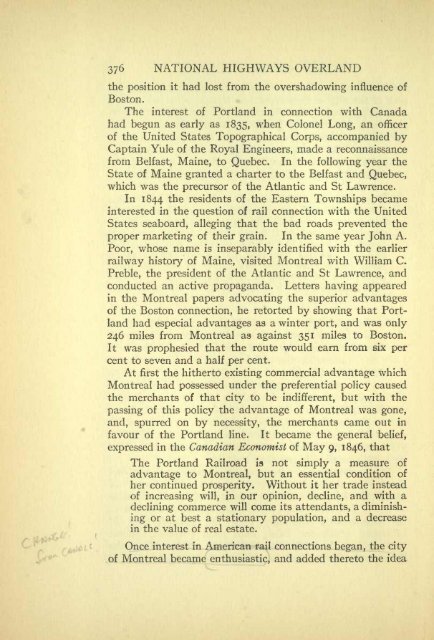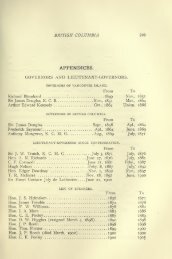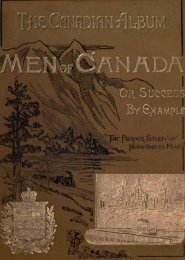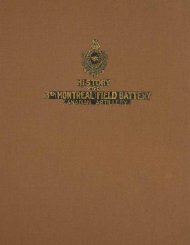- Page 2: WITHDRAWN oLibraru
- Page 9: Archives Edition CANADA AND ITS PRO
- Page 15 and 16: CANADA AND ITS PROVINCES A HISTORY
- Page 17 and 18: CONTENTS NATIONAL HIGHWAYS OVERLAND
- Page 19: SIR JOHN . ILLUSTRATIONS A. MACDONA
- Page 22 and 23: Vvr l/rxHl & _^fV64*4ft Jti: { fL f
- Page 24 and 25: RAILWAY SYSTEMS Canadian Pacific Ca
- Page 26 and 27: RAILWAY SYSTEMS Canadian Pacific mm
- Page 29 and 30: NATIONAL HIGHWAYS OVERLAND SETTLEME
- Page 31 and 32: EARLY GENERAL HISTORY 361 Mackinaw
- Page 33 and 34: EARLY GENERAL HISTORY 363 This road
- Page 35 and 36: EARLY GENERAL HISTORY 365 the oblig
- Page 37 and 38: EARLY GENERAL HISTORY 367 it was ur
- Page 39 and 40: EARLY GENERAL HISTORY 369 purposes
- Page 41: U w H U s g = H - 3 i H O in ; &
- Page 44 and 45: 372 NATIONAL HIGHWAYS OVERLAND carr
- Page 46 and 47: 374 NATIONAL HIGHWAYS OVERLAND Mont
- Page 50 and 51: 378 NATIONAL HIGHWAYS OVERLAND II T
- Page 52 and 53: 380 NATIONAL HIGHWAYS OVERLAND impe
- Page 54 and 55: 382 NATIONAL HIGHWAYS OVERLAND Appa
- Page 56 and 57: 384 NATIONAL HIGHWAYS OVERLAND leas
- Page 58 and 59: 386 NATIONAL HIGHWAYS OVERLAND cate
- Page 60 and 61: 388 NATIONAL HIGHWAYS OVERLAND cont
- Page 62 and 63: 390 NATIONAL HIGHWAYS OVERLAND a co
- Page 64 and 65: 392 NATIONAL HIGHWAYS OVERLAND The
- Page 66 and 67: 394 NATIONAL HIGHWAYS OVERLAND Fift
- Page 68 and 69: 396 NATIONAL HIGHWAYS OVERLAND char
- Page 70 and 71: 393 NATIONAL HIGHWAYS OVERLAND coun
- Page 72 and 73: 400 NATIONAL HIGHWAYS OVERLAND St L
- Page 74 and 75: 402 NATIONAL HIGHWAYS OVERLAND Huro
- Page 76 and 77: 404 NATIONAL HIGHWAYS OVERLAND the
- Page 78 and 79: 406 NATIONAL HIGHWAYS OVERLAND sibl
- Page 80 and 81: 408 NATIONAL HIGHWAYS OVERLAND fram
- Page 82 and 83: 4io NATIONAL HIGHWAYS OVERLAND take
- Page 84 and 85: 412 NATIONAL HIGHWAYS OVERLAND been
- Page 86 and 87: 414 NATIONAL HIGHWAYS OVERLAND oper
- Page 88 and 89: 416 NATIONAL HIGHWAYS OVERLAND acti
- Page 90 and 91: 4i8 NATIONAL HIGHWAYS OVERLAND guar
- Page 93 and 94: CONFEDERATION AND RAILWAY EXPANSION
- Page 95 and 96: CONFEDERATION AND RAILWAY EXPANSION
- Page 97 and 98: CONFEDERATION AND RAILWAY EXPANSION
- Page 99 and 100:
CONFEDERATION AND RAILWAY EXPANSION
- Page 101 and 102:
CONFEDERATION AND RAILWAY EXPANSION
- Page 103 and 104:
CONFEDERATION AND RAILWAY EXPANSION
- Page 105 and 106:
CONFEDERATION AND RAILWAY EXPANSION
- Page 107 and 108:
THE GOVERNMENT AND THE RAILWAYS 433
- Page 109 and 110:
THE GOVERNMENT AND THE RAILWAYS 435
- Page 111 and 112:
THE GOVERNMENT AND THE RAILWAYS 437
- Page 113 and 114:
THE GOVERNMENT AND THE RAILWAYS 439
- Page 115 and 116:
THE GOVERNMENT AND THE RAILWAYS 441
- Page 117 and 118:
THE GOVERNMENT AND THE RAILWAYS 443
- Page 119 and 120:
THE GOVERNMENT AND THE RAILWAYS 445
- Page 121 and 122:
THE GOVERNMENT AND THE RAILWAYS 447
- Page 123 and 124:
RECENT RAILWAY DEVELOPMENT 449 the
- Page 125:
SIR WILLIAM VAN HORNE From a painti
- Page 128 and 129:
452 NATIONAL HIGHWAYS OVERLAND pris
- Page 130 and 131:
454 NATIONAL HIGHWAYS OVERLAND cons
- Page 132 and 133:
456 NATIONAL HIGHWAYS OVERLAND sign
- Page 134 and 135:
458 NATIONAL HIGHWAYS OVERLAND peni
- Page 136 and 137:
460 NATIONAL HIGHWAYS OVERLAND to t
- Page 138 and 139:
462 NATIONAL HIGHWAYS OVERLAND From
- Page 140 and 141:
464 NATIONAL HIGHWAYS OVERLAND Unit
- Page 142 and 143:
466 NATIONAL HIGHWAYS OVERLAND Rivi
- Page 144 and 145:
468 NATIONAL HIGHWAYS OVERLAND more
- Page 146 and 147:
470 NATIONAL HIGHWAYS OVERLAND by m
- Page 148 and 149:
472 NATIONAL HIGHWAYS OVERLAND ordi
- Page 151 and 152:
^ ""^HE SHIPPING AND CANA
- Page 153 and 154:
SHIPPING UNDER THE FRENCH REGIME 47
- Page 155 and 156:
SHIPPING UNDER THE FRENCH REGIME 47
- Page 157 and 158:
SHIPPING UNDER THE FRENCH REGIME 48
- Page 159 and 160:
SHIPPING UNDER THE FRENCH REGIME 48
- Page 161 and 162:
SHIPPING ON THE GREAT LAKES, 1760-1
- Page 163 and 164:
SHIPPING ON THE GREAT LAKES, 1760-1
- Page 165 and 166:
SHIPPING ON THE GREAT LAKES, 1760-1
- Page 167 and 168:
SHIPPING ON THE GREAT LAKES, 1760-1
- Page 169 and 170:
BEGINNINGS OF INLAND STEAM NAVIGATI
- Page 171 and 172:
BEGINNINGS OF INLAND STEAM NAVIGATI
- Page 173 and 174:
BEGINNINGS OF INLAND STEAM NAVIGATI
- Page 175 and 176:
BEGINNINGS OF INLAND STEAM NAVIGATI
- Page 177 and 178:
BEGINNINGS OF INLAND STEAM NAVIGATI
- Page 179 and 180:
THE CANALS OF CANADA 503 Up the St
- Page 181 and 182:
THE CANALS OF CANADA 505 UNDER BRIT
- Page 183 and 184:
THE CANALS OF CANADA 507 Engineers,
- Page 185 and 186:
THE CANALS OF CANADA 509 their requ
- Page 187 and 188:
THE CANALS OF CANADA 511 with 9 fee
- Page 189 and 190:
THE CANALS OF CANADA 513 north shor
- Page 191 and 192:
THE CANALS OF CANADA 515 St Lawrenc
- Page 193 and 194:
THE CANALS OF CANADA 517 early year
- Page 195 and 196:
THE CANALS OF CANADA 519 pete comme
- Page 197 and 198:
THE CANALS OF CANADA 521 sold witho
- Page 199 and 200:
THE CANALS OF CANADA 523 THE WELLAN
- Page 201:
WILLIAM HAMILTON MERRITT From a con
- Page 204 and 205:
526 SHIPPING AND CANALS water, exce
- Page 206 and 207:
528 SHIPPING AND CANALS source of s
- Page 208 and 209:
530 SHIPPING AND CANALS possibiliti
- Page 210 and 211:
532 SHIPPING AND CANALS doned, its
- Page 212 and 213:
534 SHIPPING AND CANALS PROPOSED CA
- Page 214 and 215:
536 SHIPPING AND CANALS to Lake Sup
- Page 216 and 217:
538 SHIPPING AND CANALS The Fronten
- Page 218:
| tared Parry Sound i -ket>
- Page 221 and 222:
540 SHIPPING AND CANALS the Lake On
- Page 223 and 224:
542 SHIPPING AND CANALS thrilling s
- Page 225 and 226:
544 SHIPPING AND CANALS port was ma
- Page 227 and 228:
546 SHIPPING AND CANALS line the di
- Page 229 and 230:
548 SHIPPING AND CANALS Port Stanle
- Page 231 and 232:
550 SHIPPING AND CANALS percentage
- Page 233 and 234:
552 SHIPPING AND CANALS in 1866. Th
- Page 235 and 236:
554 SHIPPING AND CANALS Company, wh
- Page 237 and 238:
556 SHIPPING AND CANALS in 1913 at
- Page 239 and 240:
558 SHIPPING AND CANALS VII MARITIM
- Page 241 and 242:
560 SHIPPING AND CANALS the standin
- Page 243 and 244:
562 SHIPPING AND CANALS is an impor
- Page 245 and 246:
564 SHIPPING AND CANALS British-bui
- Page 247 and 248:
566 SHIPPING AND CANALS is navigabl
- Page 249 and 250:
568 SHIPPING AND CANALS There will
- Page 251 and 252:
570 SHIPPING AND CANALS the first s
- Page 253 and 254:
572 SHIPPING AND CANALS The two lar
- Page 255 and 256:
574 SHIPPING AND CANALS made there
- Page 257 and 258:
576 SHIPPING AND CANALS However, th
- Page 259 and 260:
578 SHIPPING AND CANALS was added t
- Page 261 and 262:
580 SHIPPING AND CANALS just passin
- Page 263 and 264:
582 SHIPPING AND CANALS Nicolas Wen
- Page 265 and 266:
584 SHIPPING AND CANALS the United
- Page 267 and 268:
586 SHIPPING AND CANALS the best of
- Page 269 and 270:
588 SHIPPING AND CANALS turned out
- Page 271 and 272:
590 SHIPPING AND CANALS same sentim
- Page 273:
VNADA SHIPPING t or "Canaxla a
- Page 276 and 277:
592 SHIPPING AND CANALS navigation
- Page 278 and 279:
594 SHIPPING AND CANALS test the po
- Page 280 and 281:
596 SHIPPING AND CANALS natural end
- Page 283 and 284:
OCEAN SHIPPING 597 In the meantime
- Page 285 and 286:
OCEAN SHIPPING 599 with a gross ton
- Page 287 and 288:
OCEAN SHIPPING 601 and 1620 third-c
- Page 289 and 290:
OCEAN SHIPPING 603 Hugh was a man o
- Page 291 and 292:
OCEAN SHIPPING 605 negotiations wit
- Page 293 and 294:
OCEAN SHIPPING 607 London direct. A
- Page 295 and 296:
OCEAN SHIPPING 609 mail subsidy. In
- Page 297 and 298:
OCEAN SHIPPING 611 However, since i
- Page 299 and 300:
OCEAN SHIPPING 613 and some ten ves
- Page 301 and 302:
OCEAN SHIPPING 615 trading between
- Page 303 and 304:
OCEAN SHIPPING 617 Britain via Gibr
- Page 305 and 306:
OCEAN SHIPPING 619 in conjunction w
- Page 307 and 308:
OCEAN SHIPPING 621 water alongside
- Page 309 and 310:
OCEAN SHIPPING 623 Excelling Montre
- Page 311:
THE BANKING SYSTEM OF CANADA
- Page 314 and 315:
628 THE BANKING SYSTEM OF CANADA no
- Page 316 and 317:
630 THE BANKING SYSTEM OF CANADA co
- Page 318 and 319:
632 THE BANKING SYSTEM OF CANADA be
- Page 320 and 321:
634 THE BANKING SYSTEM OF CANADA no
- Page 322 and 323:
636 unduly THE BANKING SYSTEM OF CA
- Page 324 and 325:
638 THE BANKING SYSTEM OF CANADA li
- Page 326 and 327:
640 THE BANKING SYSTEM OF CANADA re
- Page 328 and 329:
642 THE BANKING SYSTEM OF CANADA a
- Page 330 and 331:
644 THE BANKING SYSTEM OF CANADA th
- Page 332 and 333:
646 THE BANKING SYSTEM OF CANADA th
- Page 334 and 335:
648 THE BANKING SYSTEM OF CANADA RE
- Page 336 and 337:
650 THE BANKING SYSTEM OF CANADA wo
- Page 338 and 339:
652 THE BANKING SYSTEM OF CANADA Mi
- Page 340 and 341:
654 THE BANKING SYSTEM OF CANADA a
- Page 342 and 343:
656 THE BANKING SYSTEM OF CANADA Th
- Page 344 and 345:
658 THE BANKING SYSTEM OF CANADA th
- Page 346:
660 THE BANKING SYSTEM OF CANADA cr
- Page 351 and 352:
Shortt, Adam Canada and its provinc

















